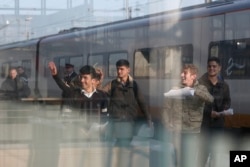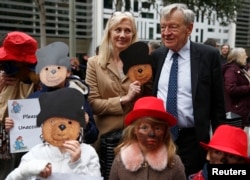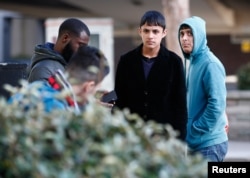More than 200 of Britain’s top celebrities, including movie stars Ralph Fiennes, Keira Knightley and Benedict Cumberbatch, and playwrights Tom Stoppard and David Hare, have called on the British government to reinstate a resettlement program for child refugees.
Only 200 unaccompanied children have been accepted under the nine-month plan. Another 150 will be admitted in the next few weeks before it is closed.
In an open letter Tuesday addressed to Britain’s Prime Minister Theresa May, the celebrities describe as “truly shameful” the decision to stop the program. “The idea that as a country we will slam the door shut after just 350 children have reached safety is completely unacceptable,” they wrote.
“The country we know and love is better than this,” they added.
The plan to admit lone child refugees wandering in Europe after fleeing the Mideast was never a government idea in the first place. The government set it up reluctantly after lawmakers and peers passed an amendment to new immigration legislation last April. The lawmakers expected the number of unaccompanied children admitted would be more like 3,000. It took five months after the passing of the amendment for the government to resettle any child refugees stranded in Europe.
Britain’s "red-top" tabloid newspapers reacted furiously when the first handful of child refugees, who had been at a camp in Calais, were admitted under the plan, arguing on the basis purely of photographs that they weren’t kids. They raised the specter the resettled refugees posed a security risk, which some observers say influenced the government’s already jaundiced attitude toward the program.
The amendment creating the program was proposed by Alf Dubs, a Labour peer who as a six-year-old was one of 669 mostly Jewish children who fled Czechoslovakia in 1939 and were admitted into Britain thanks to the voluntary efforts of a young British stockbroker, Nicholas Winton.
In their letter, the celebrities noted the plan wouldn’t match Winton’s efforts in wartime Europe by the time it is closed. Nor, they argue, will it compare favorably to Britain’s Kindertransport humanitarian program, which ran between November 1938 to September 1939 and oversaw the admittance of 10,000 mostly Jewish children who fled Nazi Europe.
The wartime government agreed to speed up the immigration process by issuing travel documents to the Kindertransport children on the basis of group lists, rather than individual applications.
Announcing the winding down of the so-called "Dubs scheme", government Minster Amber Rudd argued last Thursday, “it acts as a magnet and encourages people traffickers.” She said most vulnerable children were stuck in camps in Jordan and Lebanon, from where the government still intends to bring 3,000 to Britain, the number lawmakers were led to believe would be admitted under the Dubs amendment.
But refugee campaigners doubt the sincerity of the government when it comes to increasing the tally of refugees from the Mideast and Horn of Africa. Especially as a separate, accelerated arrangement to bring in unaccompanied refugee children who have family members already living in Britain is to be scrapped also.
The government’s argument the "Dubs scheme" incentivizes children to make perilous journeys across Europe that risk them falling into the hands of people traffickers, is dismissed by refugee campaigners. They say with or without resettlement plans in Europe and Britain refugees will keep coming.
Ending the program will put child refugees more at the mercy of traffickers, argues Aidan McQuade, director of Anti-Slavery International, a London-based rights group.
“The absence of a comprehensive approach to the refugee crisis in the Mediterranean, particularly the absence of safe migration options for vulnerable people fleeing war has been the single greatest factor to increase the risk of human trafficking in Europe over the past two years,” he said.
The comparisons campaigners and Alf Dubs have drawn with the Kindertransport and the Holocaust has drawn impassioned rebuttals from opponents. “Neither the Syrian civil war, brutal and unspeakable as it is, nor any other current conflict can be compared to the Holocaust,” argues commentator Melanie Phillips.
Writing in The Times newspaper, she said. “Today’s migrant crisis is part of a mass movement of people, not all of them refugees, which threatens to engulf western Europe ... It is nauseating that the Holocaust is being used as an emotional bludgeon, so that anyone who supports restrictions on today’s migrants is not only attacked as a heartless monster, but also for somehow betraying the memory of the victims of Nazism.”
In January 2016, Europol, a European Union agency, estimated 10,000 child refugees had disappeared after arriving unaccompanied in Europe. The agency said it feared many had become victims of exploitation. European authorities estimated that nearly 90,000 unaccompanied children from the Middle East and Africa sought asylum in Europe in 2015.



